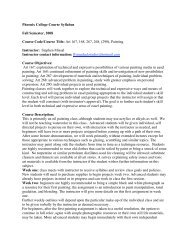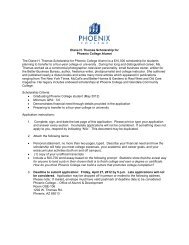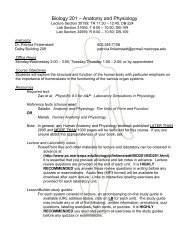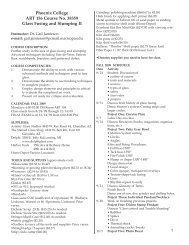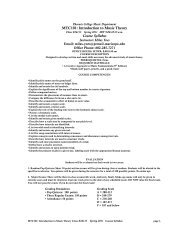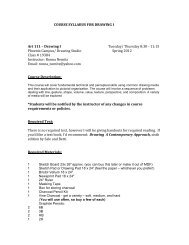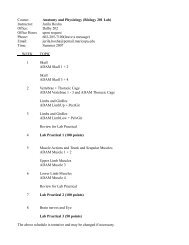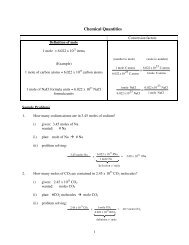Phoenix College Catalog 2009-10
Phoenix College Catalog 2009-10
Phoenix College Catalog 2009-10
You also want an ePaper? Increase the reach of your titles
YUMPU automatically turns print PDFs into web optimized ePapers that Google loves.
<strong>Phoenix</strong> <strong>College</strong> <strong>2009</strong>–20<strong>10</strong> CATALOG | 71<br />
III. Maximum Timeframe Eligibility<br />
A. Students who have attempted more than 150% of the<br />
credits required for their program of study are not considered<br />
to be making Satisfactory Academic Progress and,<br />
therefore, are ineligible for financial aid funds.<br />
B. All evaluated transfer credits will be included when<br />
determining maximum timeframe eligibility.<br />
C. A student with a Bachelor's degree or higher will be<br />
considered to have exhausted maximum timeframe<br />
eligibility.<br />
D. A student may appeal as outlined in V.<br />
E. Reinstatement procedures as outlined in VI are not<br />
applicable to Maximum Timeframe Eligibility.<br />
IV. Repeated, Audited, Consortium, Remedial Courses,<br />
Summer<br />
A. Financial aid may be used to cover the cost of repeated<br />
courses.<br />
B. Audited courses, non-credit courses, credit by examination,<br />
and any credit for prior learning option (as outlined in the<br />
catalog) are excluded when determining eligibility for<br />
financial aid.<br />
C. Courses funded through a consortium agreement are<br />
included in determining academic progress.<br />
D. All attempted remedial credits will be included when<br />
evaluating SAP. (A maximum of 30 remedial credit hours,<br />
excluding ESL courses, may be funded.)<br />
E. Enrollment in any or all summer sessions within the same<br />
calendar year will be considered one term.<br />
V. Appeal Process<br />
A student who has lost financial aid eligibility due to extenuating<br />
circumstances may appeal.<br />
A. Extenuating circumstances that may be considered include:<br />
personal illness or accident, serious illness or death within<br />
immediate family, or other circumstances beyond the<br />
reasonable control of the student.<br />
B. All appeals must be in writing to the Financial Aid Office<br />
where the student is applying for aid and include appropriate<br />
documentation.<br />
C. Examples of documentation could include an obituary<br />
notice, divorce decree, or a letter from a physician,<br />
attorney, social services agency, parole officer, etc.<br />
D. The condition or situation must be resolved which will<br />
allow the student the ability to complete course work<br />
successfully or an appeal will not be granted.<br />
E. The outcome of an appeal may include approval, a<br />
probationary period, or denial.<br />
F. A student will be notified in writing of the results of the<br />
appeal, and of any restrictions or conditions pertaining to<br />
their appeal.<br />
VI. Reinstatement of Financial Aid Eligibility<br />
A. A student who has lost financial aid eligibility may be<br />
reinstated after the student has taken (without federal<br />
funds) at least six credit hours in a semester, passed all<br />
attempted credit hours, and meets minimum cumulative<br />
GPA requirements.<br />
B. If the student attempts more than six hours, the student<br />
will be evaluated on all attempted credit hours within that<br />
term.<br />
C. Classes taken at other colleges will not be taken into<br />
consideration for reinstatement purposes.<br />
D. It is the student's responsibility to notify the Office of<br />
Student Financial Aid when this condition has been met.<br />
For more information, please contact the Financial Aid Office.<br />
Refunds and Repayments<br />
In accordance with federal regulations (CFR 668.22), a student may<br />
be required to repay federal financial aid funds if they completely<br />
withdraw, are withdrawn, or fail to earn a passing grade from all<br />
classes during a semester. Further information is available at the<br />
college Office of Student Financial Aid. This could affect a student's<br />
ability to receive Financial Aid in the future at any school. For a<br />
student receiving Financial Aid, also see Appendix S-7 on page 72 for<br />
Withdrawal procedures.<br />
If you are receiving federal financial aid it is important to read<br />
the information below prior to making a decision to withdraw.<br />
Treatment of Title IV Aid When a Student Withdraws<br />
The law specifies how your school must determine the amount of<br />
Title IV program assistance that you earn if you withdraw from<br />
school. The Title IV programs that are covered by this law are: Federal<br />
Pell Grants, Academic Competitiveness Grants, National<br />
SMARTgrants, TEACH Grants, Stafford Loans, PLUS Loans, Federal<br />
Supplemental Educational Opportunity Grants (FSEOGs), and Federal<br />
Perkins Loans.<br />
When you withdraw during your payment period or period of<br />
enrollment (you may contact the Financial Aid office to define these<br />
for you and tell you which one applies) the amount of Title IV program<br />
assistance that you have earned up to that point is determined by a<br />
specific formula. If you received (or your school or parent received on<br />
your behalf) less assistance than the amount that you earned, you<br />
may be able to receive those additional funds. If you received more<br />
assistance than you earned, the excess funds must be returned by<br />
the school and/or you.<br />
The amount of assistance that you have earned is determined on a<br />
pro-rata basis. For example, if you completed 30% of your payment<br />
period or period of enrollment, you earn 30% of the assistance you<br />
were originally scheduled to receive. Once you have completed more<br />
than 60% of the payment period or period of enrollment, you earn all<br />
the assistance that you were scheduled to receive for that period.<br />
If you did not receive all of the funds that you earned, you may be due<br />
a post-withdrawal disbursement. If your post-withdrawal disbursement<br />
includes loan funds, your school must get your permission before it<br />
can disburse them. You may choose to decline some or all of the loan<br />
funds so that you don’t incur additional debt. Your school may<br />
automatically use all or a portion of your post-withdrawal disbursement<br />
of grant funds for tuition, fees, and room and board charges (as<br />
contracted with the school). The school needs your permission to<br />
use the post-withdrawal grant disbursement for all other school<br />
charges. If you do not give your permission, you will be offered the<br />
funds. However, it may be in your best interest to allow the school to<br />
keep the funds to reduce your debt at the school.<br />
There are some Title IV funds that you were scheduled to receive that<br />
cannot be disbursed to you once you withdraw because of other<br />
eligibility requirements. For example, if you are a first-time, first-year<br />
undergraduate student and you have not completed the first 30 days<br />
of your program before you withdraw, you will not receive any FFEL<br />
or Direct loan funds that you would have received had you remained<br />
enrolled past the 30th day.<br />
If you receive (or your school or parent, receive on your behalf)<br />
excess Title IV program funds that must be returned, your school<br />
must return a portion of the excess equal to the lesser of:<br />
1. your institutional charges multiplied by the unearned percentage<br />
of your funds, OR<br />
2. the entire amount of excess funds.<br />
The school must return this amount even if it didn’t keep this amount<br />
of your Title IV program funds.<br />
If your school is not required to return all of the excess funds, you<br />
must return the remaining amount. Any loan funds that you must<br />
return, you (or your parent for a PLUS Loan) repay in accordance with<br />
the terms of the promissory note. That is, you make scheduled<br />
payments to the holder of the loan over a period of time. Any amount<br />
of unearned grant funds that you must return is called an overpayment.<br />
The maximum amount of a grant overpayment that you must repay<br />
is half of the grant funds you received or were scheduled to receive.<br />
You must make arrangements with your school or the Department of<br />
Education to return the unearned grant funds.<br />
MCCCD Common Policies



